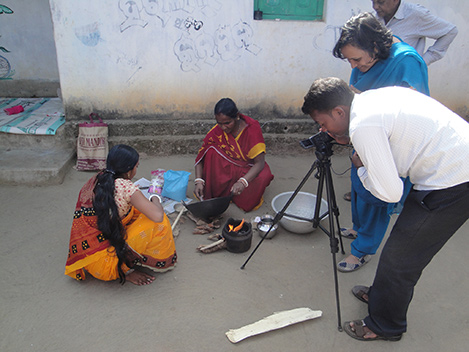ENGINE Project Intervention Documentaries
ENGINE, September 2015
ENGINE, September 2015
Sisimpur has collaborated with SPRING/Bangladesh to prepare a live action segment on tippy taps with adolescent children as protagonists to promote hand washing.

Chima runs into her neighbors on the way to the field, and her neighbor, Rakiya, explains that she is carrying a snack to the field for her baby to eat, even though her baby has already had breakfast. Rakiya explains that it is important to feed young children frequently. While Rakiya and her husband work in the field, their older son feeds the baby. Chima asks the community health worker (CHW) about the frequency of feeding her child who is under two.
While a woman is separating some food from the family meal for her young child, the community health worker (CHW) stops by. He congratulates the woman for feeding her child diverse foods on a separate plate and encourages her to also pound meat to add to the child’s meal. Later, the CHW picks Moringa leaves and tomatoes in his garden and explains to his friend that he will dry and store them to feed his children a diverse diet when the dry season arrives. He then demonstrates how to dry and store the leaves and tomatoes.
Zaru visits her friend Aicha, and asks how Aicha is able to combine successfully exclusive breastfeeding with her work. Aicha explains that her family helps to reduce her work load, and her husband ensures Aicha has enough healthy food. When Zaru does not know how to discuss this with her family, Aicha and Zaru see the community health worker (CHW). After the CHW has explained some common misunderstandings about breastfeeding, she follows Zaru home and after some discussion, her husband and mother-in-law agree to support Zaru in exclusively breastfeeding her child.
A woman delivers at a health center and breastfeeds her baby immediately after the delivery. The midwife explains the importance of exclusive breastfeeding until 6 months, as well as proper positioning and attachment of the baby. She tells the new mother to breastfeed 8-12 times throughout the day and night. Upon returning home, the woman’s family supports her while she breastfeeds. The midwife concludes by summarizing the importance of exclusive breastfeeding.
A woman prepares porridge for her baby, and asks her husband to feed the child while she goes out. The husband washes his and his baby’s hands and patiently encourages her to eat, following active/responsive feeding recommendations. In another household, older children properly encourage the younger children to eat from a separate plate and supervised by the father. The two husbands then discuss the 1000 days behaviors and why they are important to keep their children healthy and strong.
Sahoura asks her neighbor, Mariama, why her children are less healthy than Mariama’s, even though Sahoura practices the 1000 days behaviors. Mariama explains that it is important for everyone to wash their hands with soap at critical times during the day to prevent infections. She takes Sahoura to see their water station for the household. He explains the proper method of handwashing at their Tippy Tap, and then Mariama shows how to wash the hands of her young child.
Olney, D.K, Pedehombga, A., Ruel, M.T., & Dillon, A. The Journal of Nutrition (June 2015) Vol. 145, No.6, pp. 1317-1324.